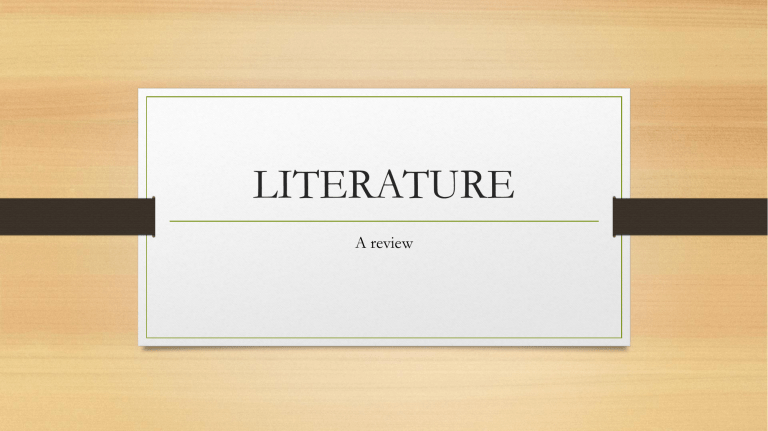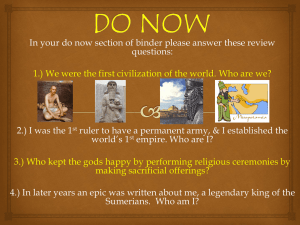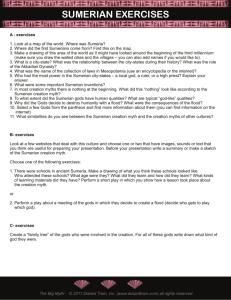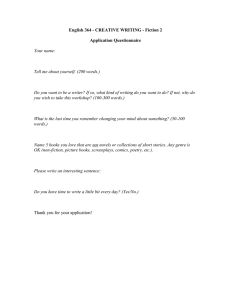
LITERATURE A review WHAT IS LITERATURE? • From the Latin litterātūra meaning letter, is the entire body of writings in a specific language, period and with a particular subject. • In short terms, is any written work. Then, literature is… • • • • • • Novels Poems Dictionaries Math book Brochures Notes from the notebook FICTION AND NON-FICTION Fiction Literature of imaginative narration Non-fiction Literature based on facts and reality FORMS OF LITERATURE VERSE A metrical line composed of one line PROSE Ordinary form of expression without metrical structure Types of prose work Novels Short Stories Novellas Novelettes Essays Biographies Newspaper articles HISTORY ANCIENT EGYPT • Writing in ancient Egypt—both hieroglyphic and hieratic, literary works included funerary texts, epistles and letters, hymns and poems, and commemorative autobiographical texts recounting the careers of prominent administrative officials. • Major narrative works from the Middle Kingdom include the Tale of the Court of King Cheops, King Neferkare and General Sasenet, The Eloquent Peasant, Story of Sinuhe, and Tale of the shipwrecked sailor. Book of the Dead ANCIENT SUMERIAN • The Sumerians invented one of the first writing systems, developing Sumerian cuneiform. • Most Sumerian literature is apparently poetry; it is written in left-justified lines, and could contain line-based organization such as the couplet or the stanza, but the Sumerian definition of poetry is unknown. It is not rhymed. It did not use syllabo-tonic versification and the writing system precludes detection of rhythm, metre, rhyme, or alliteration. Epic of Gilgamesh ORAL TRADITION • Oral tradition is a form of human communication wherein knowledge, art, ideas and cultural material is received, preserved and transmitted orally from one generation to another. • The transmission is through speech or song and may include folktales, ballads, chants, prose or verses. Myths of the origin of the world • A creation myth is a cultural, traditional or religious myth which describes the earliest beginnings of the present world. • Creation myths are the most common form of myth, usually developing first in oral traditions, and are found throughout human culture Other prose literature • • • • • • Scientific literature Philosophical (Socrates, Plato, Descartes, Nietzsche) Psychological Journalism Law (Hammurabi’s Code, parts of the Bible, Constitution of the USA) Graphic novels and comic books PAPER and PRINTING • The first papermaking process was documented in China during the Eastern Han period (25–220 AD) • Johannes Gutenberg is usually cited as the inventor of the printing press. Indeed, the German goldsmith's 15th-century contribution to the technology was revolutionary — enabling the mass production of books and the rapid dissemination of knowledge throughout Europe. FUN FACTS • According to Guinness World Records as of 1995, the Bible is the bestselling book of all time, with an estimated 5 billion copies sold and distributed. • Having sold more than 500 million copies worldwide, Harry Potter by J. K. Rowling is the best-selling book series in history. The first novel in the series, Harry Potter and the Philosopher's Stone, has sold in excess of 120 million copies, making it one of the best-selling books of all time. • The most translated book in history is the Bible with more 5,000 languages • The Little Prince is the most translated book in history, excluding the Bible. “Don Quixote” • “The most meaningful book of all time“. Don Quixote, written by Miguel de Cervantes, is actually regarded as the birth of the genre of the novel in literary history. William Shakespeare • It is widely regarded as both the greatest writer in the English language, and the world's pre-eminent dramatist.




